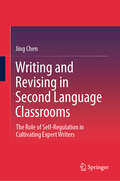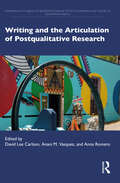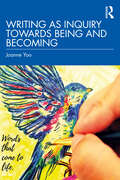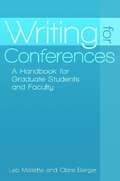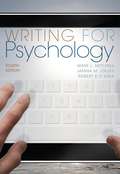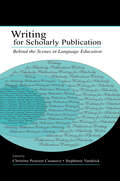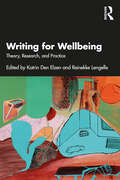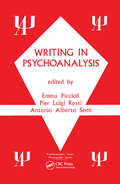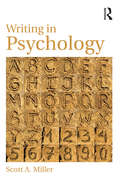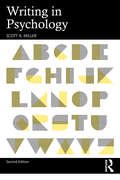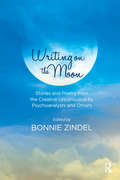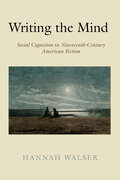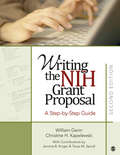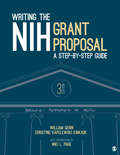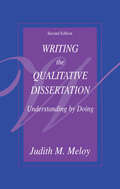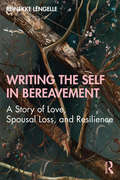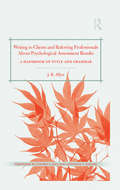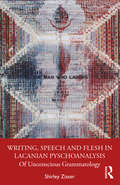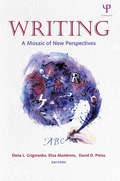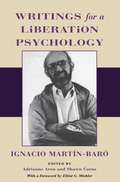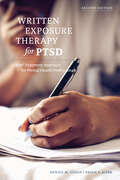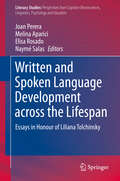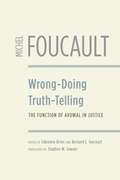- Table View
- List View
Writing and Revising in Second Language Classrooms: The Role of Self-Regulation in Cultivating Expert Writers
by Jing ChenThis book contributes to the field of L2 writing, with a focus on instruction in revision. Theoretically, this research provides a better understanding of students’ metacognitive knowledge about revision and their self-efficacy for text revision in EFL writing; such understanding is vital to make pedagogical connections between cognitive research, self-efficacy theory and instructional research in writing. Moreover, the designed questionnaire for data collection and analysis in this study can be employed as a diagnostic or consciousness-raising tool in the L2 writing classrooms or be used as a research tool to chart the development of students’ metacognitive knowledge about revision and self-efficacy for text revision over time to contribute to this line of research. Pedagogically, this study examined the effects of the SRSD model, an approach that has shown its effectiveness in improving learners’ metacognition and impacting their self-efficacy in both L1 and L2 writing, in the context of revision in an EFL context. Hence, it broadens the understanding of the feasibility and effectiveness of the SRSD model.
Writing and the Articulation of Postqualitative Research (International Congress of Qualitative Inquiry (ICQI) Foundations and Futures in Qualitative Inquiry)
by David Lee Carlson Ananí M. Vasquez Anna RomeroWriting and the Articulation of Postqualitative Research is a collection of experimental essays on the implications of articulating or performing qualitative research from postqualitative philosophies. Although writing has been an integral part of qualitative research, for better or worse, throughout the history of the field, the recent emergence of postqualitative inquiry necessitates a reconsideration of writing. This collection of international authors explores the process and practice of writing in qualitative research from an onto-epistemological perspective, engaging with temporal, spatial, relational, social-cultural, and affective concepts and dilemmas such as philosophical alignment, advocacy in research, and the privileging of written academic language for research dissemination. The exploration of these questions can help qualitative researchers in the social sciences and humanities consider how modalities and processes of writing can alter, shift, and challenge the ways in which they articulate their research. Thus, rather than writing being a conveyor of the events happening during data collection, or used to analyze data or display results, the authors in this book consider writing as a primary agent in the research process. This book has been designed for scholars in the social sciences and humanities who want to rethink how they use writing in their research endeavors and especially ones who are considering engaging with postqualitative research.
Writing as Inquiry Towards Being and Becoming
by Joanne YooWriting as Inquiry Towards Being and Becoming provides a guide to the different phases of growth experienced when undertaking creative forms of academic writing and inquiry. It describes how embodied, aesthetic, and poetic forms of academic inquiry can be a catalyst for both personal and professional growth.In the author's trademark thoughtful, lyrical writing style, this book moves beyond the technical skills of writing to exploring the reasons why we should engage in creative inquiry. It raises fundamental questions regarding the expansive and ontological possibilities of qualitative inquiry and how it can help us to exist meaningfully in this world.This book is suitable for students and scholars of creative and qualitative inquiry who are interested in the writing process and how it shapes our identities as researchers in education, the social sciences, and communication studies.
Writing for Conferences: A Handbook for Graduate Students and Faculty
by Leo A. Mallette Clare BergerThe authors present a practical text for graduate students and faculty, as well as professionals working in areas outside academia--businesses, government entities, and nonprofit organizations--that encourage employees to publish at conferences. Organized into sections corresponding to the timeline of a conference paper, the text covers reasons for choosing to publish at conferences versus in journals or magazines, what it will cost, and publishing statistics; steps for selecting the right conference, including finding upcoming conferences, reading a call for papers, and the timeline for submitting a paper to a conference; deciding on solo authorship versus multiple authorship, finding co-authors, and the abstract submission process; writing a paper in a scholarly way; preparing for and giving the conference presentation; social interaction and networking at the conference; and how to be session chair. The material is illustrated throughout with case studies, examples, and vignettes from the literature and the authors' experiences.
Writing for Psychology
by Janina M. Jolley Mark L. Mitchell Robert P. O'SheaWRITING FOR PSYCHOLOGY, Fourth Edition offers concise assistance for students writing their research analyses using APA style. By providing concrete examples of common errors, the authors show rather than merely tell students what to do and what to avoid. This manual will help students adhere to the basics of APA style; refine critical thinking skills, library search skills, revising skills, editing skills, and proofing skills; and avoid plagiarism. Checklists precede a summary at the end of every chapter, giving students the chance to make sure they have been thorough in their reports.
Writing for Scholarly Publication: Behind the Scenes in Language Education
by Stephanie Vandrick Christine Pearson CasanaveThis collection of first-person essays by established authors provides a wealth of support and insights for new and experienced academic writers in language education and multicultural studies. Although writing for publication is becoming increasingly important as these fields become both more professional and more competitive, few scholars talk candidly about their experiences negotiating a piece of writing into print. These essays will help researchers, practitioners, and graduate students expand their understanding of what it means--professionally and personally--to write for publication. Carefully crafted, focused, and provocative, the chapters in this volume document authors' experiences with a range of practical, political, and personal issues in writing for publication. Many portray the hardship and struggle that are not obvious in a finished piece of writing. Readers are encouraged to resonate with the events and issues portrayed, and to connect the narratives to their own lives. Practical information, such as contact information for journal and book publishers, manuscript guidelines, and useful books are included in appendices. Although organized thematically, the essays in Writing for Scholarly Publication: Behind the Scenes in Language Education overlap in many ways as each author considers multiple issues: *In the Introduction, the editors discuss key aspects of writing for scholarly publication, such as writing as situated practice, issues faced by newcomers, the construction of personal identity through writing, writing and transparency, facets of the interactive nature of scholarly writing, and intertwined political issues. *Part I focuses on issues and concerns faced by "Newcomers." *In Part II, "Negotiating and Interacting," the essays closely examine the interactions among authors, editors, manuscript reviewers, and collaborators; these interactions tend to be the least often discussed and these essays therefore offer readers fascinating insights into the sensitive social, political, and personal relationships among the many players in the scholarly writing game. *"Identity Construction" is addressed in Part III, where authors share their experiences with and reflections on the ways that professional writing helps them construct their identities as writers and scholars. *The essays in Part IV, "From the Periphery," help redefine what the notion of "periphery" might mean, from a concept with a negative connotation of "outsider" to a positive connotation of active and unconventional participant.
Writing for Wellbeing: Theory, Research, and Practice
by Reinekke Lengelle Katrin Den ElzenWriting can support our wellbeing even under the most difficult life circumstances, helping us to adapt to significant change, make sense of loss, improve our physical and emotional resilience, and foster personal growth. Numerous studies of Expressive Writing have confirmed this, and there are other established methodologies for practice. However, to date, few accounts have offered detailed descriptions showing how and why putting pen to paper can be so beneficial. This book delves deeply into the landscape of Writing-for-wellbeing and demonstrates the transformative power of writing in a wide range of contexts. Topics include personal trauma narratives within the Humanities; a participatory Writing-for-wellbeing study that demonstrates the effectiveness of writing in the context of grief and loss; surprise as the hidden mainspring of poetry's therapeutic potency; the empowerment and healing potential offered by Black women’s blogs; playwriting positioning LGBTQIA+ identities as positive through stories of belonging; how writing workshops have helped newly literate Indigenous adults and other participants in the Australian outback; and how the smuggled writings of Behrouz Boochani have enabled global witnessing of the stories of refugees held in offshore detention. This resource sets out the theory and research at the foundation of Writing-for-wellbeing in close relation to full and engaging accounts of practice. It aims to make the topic accessible and affirms its place as an effective reconstructive practice alongside other expressive arts therapies, providing a holistic and inspiring resource for anyone wishing to practice, teach, or research Writing-for-wellbeing.
Writing in Psychoanalysis
by Giorgio Sacerdoti Parthenope Bion Talamo John E. Gedo Francesco Barale Patrick Mahony Henning Paikin Fausto Petrella Antonio Alberto SemiA beautiful and thoughtful collection of essays on reading, writing and learning, Writing and Psychoanalysis grows out of a colloquium. The results are wondrous and impact on the reader at many different levels. In the act of writing, we all discover something about what we know previously unknown to us, and we learn more about our inner world that we knew before we set pen to paper (or hand to computer). Patrick Mahony goes so far as to argue that Freud's self-analysis was essentially a "writing cure." Writing in Psychoanalysis is the first volume in the projected Monograph Series, Psychoanalytic Issues, the Rivista di Psicoanalisi (the Journal of the Italian Psychoanalytical Society) is undertaking in conjunction with Karnac Books. This series constitutes a major effort to bring about a dialogue among psychoanalysts who while ultimately bound together by a common psychoanalytic heritage nonetheless are separated in their thinking by different idioms, whether linguistic or theoretical. While featuring writers of very different idioms, this series will also present a venue to make some important Italian voices known to English speaking analysts.
Writing in Psychology
by Scott A. MillerThis book helps readers become better writers of psychology and better writers in general. After reading thousands of course papers, theses, and dissertations, Dr. Miller knows and addresses the issues that students find most challenging when writing about psychology. Written with the utmost flexibility in mind, the chapters can be read in any order. More comprehensive than similar texts, this book provides detailed coverage of how to write empirical reports, research proposals, and literature reviews, and how to read meta-analyses. Readers will also find invaluable strategies for improving one’s writing including how to adopt an engaging yet accurate style, thorough coverage of grammatical and word use rules that govern writing in general, and the APA (American Psychological Association) rules that govern the expression of that content. Readers will appreciate these helpful learning tools: Describes the most common APA style rules encountered and/or highlights references to the Manual when more detailed knowledge is required. Numerous examples from journal articles that help readers gain a clearer understanding of content they will encounter in writing psychological reports. Chapter exercises that provide an opportunity to apply the points conveyed in each chapter. Examples of the most common mistakes made by students and how to avoid them and best practices for improving one’s writing. Tables that help readers gain a clearer understanding of the new standards in the APA Publications Manual, 6th ed (Appendix A). Errors in APA Style exemplified via an improperly formatted paper and another version noting corrections pertaining to APA style and grammar, to highlight the most common pitfalls encountered by students (Appendix B). Ideal for courses on writing in psychology or as a supplement for graduate or advanced undergraduate courses in research design or research methods, this book also serves as a resource for anyone looking for guidance on how to write about psychological content.
Writing in Psychology
by Scott A. MillerThe second edition of Writing in Psychology by Scott A. Miller is a comprehensive guide to addressing the most challenging issues that students face while writing about psychology, including what to say and how to say it. It offers practical tools to overcome the challenges and create an engaging work. The book is a valuable resource for helping readers become better writers of psychology with the aid of various helpful learning tools, which provide detailed coverage of how to write empirical reviews, research proposals, literature reviews, term papers, and posters. It examines examples from journal articles that give readers a grasp of the content they will encounter in writing psychological reports. Furthermore, it includes exercises that provide an opportunity to apply the points conveyed in each chapter, examples of ways to avoid the most common mistakes made by students, and a guide to the best practices for improving one’s writing. Readers will also develop a thorough understanding of how to write in an engaging yet accurate style, using grammatical and word use rules that govern writing in general, and the rules of seventh edition APA (American Psychological Association) Publication Manual that determine the expression of that content. Throughout, the book emphasizes inclusion, diversity, and fair treatment of those with whom psychologists deal, in research and writing. The book will benefit anyone looking for guidance on how to write about psychological content. It is ideal for research scholars and psychology students as a primary text for writing in psychology courses and a supplement for graduate or advanced undergraduate courses in research design or research methods.
Writing on the Moon: Stories and Poetry from the Creative Unconscious by Psychoanalysts and Others
by Bonnie ZindelWriting on the Moon: Stories and Poetry from the Creative Unconscious by Psychoanalysts and Others is a collection of the best works published over the past fifteen years in the Creative Literary Section of Psychoanalytic Perspectives, along with imaginative introductions by the author. Some writings are raw and honest, some are dark and access our primal being. Others, filled with beauty, illuminate the internal life, the playful mind, and unconscious doodlings that might otherwise remain unformulated.
Writing the Mind: Social Cognition in Nineteenth-Century American Fiction
by Hannah WalserNovels are often said to help us understand how others think—especially when those others are profoundly different from us. When interpreting a character's behavior, readers are believed to make use of "Theory of Mind," the general human capacity to attribute mental states to other people. In many well-known nineteenth-century American novels, however, characters behave in ways that are opaque to readers, other characters, and even themselves, undermining efforts to explain their actions in terms of mental states like beliefs and intentions. Writing the Mind dives into these unintelligible moments to map the weaknesses of Theory of Mind and explore alternative frameworks for interpreting behavior. Through readings of authors such as Charles Brockden Brown, Herman Melville, Martin Delany, Harriet Beecher Stowe, Charles Chesnutt, and Mark Twain, Hannah Walser explains how experimental models of cognition lead to some of the strangest formal features of canonical American texts. These authors' attempts to found social life on something other than mental states not only invite us to revise our assumptions about the centrality of mind reading and empathy to the novel as a form; they can also help us understand more contemporary concepts in social cognition, including gaslighting and learned helplessness, with more conceptual rigor and historical depth.
Writing the NIH Grant Proposal: A Step-by-Step Guide
by William Gerin Christine Kapelewski Kinkade Jerome R. Itinger Tanya SpruillHands-on advice that simplifies, demystifies, and takes the fear out of writing a NIH grant proposal This fully updated book takes readers through the complex issues involved in applying for a prestigious NIH grant—from training grants to full-blown research awards. Actual forms from NIH grant applications—including the PHS 398 and the new SF 424 forms—are annotated to provide readers with step-by-step guidance that highlights unexpected nuances that can make all the difference between winning and losing a grant.
Writing the NIH Grant Proposal: A Step-by-Step Guide
by William Gerin Christine Kapelewski Kinkade Niki L. PageAuthors William Gerin, Christine Kapelewski, and Niki L. Page are here to help you secure NIH funding for your research! Writing the NIH Grant Proposal, Third Edition offers hands-on advice that simplifies, demystifies, and takes the fear out of writing a federal grant application. Acting as a virtual mentor, this book provides systematic guidance for every step of the NIH application process, including the administrative details, developing and managing collaborative relationships, budgeting, and building a research team. Helpful hints along the way provide tips from researchers who have received grants themselves. New to this Edition: Much more user-friendly in response to the updated NIH website Covers the new Application Submission System & Interface for Submission Tracking (ASSIST) online submission form for both single and multiple projects Revamped advice on substantive sections of the proposal to address lowered page allowance Coverage of the new scoring system and reviewer reporting system Coverage of the usage and submission of the new SF 424 forms
Writing the NIH Grant Proposal: A Step-by-Step Guide
by William Gerin Christine Kapelewski Kinkade Niki L. PageAuthors William Gerin, Christine Kapelewski, and Niki L. Page are here to help you secure NIH funding for your research! Writing the NIH Grant Proposal, Third Edition offers hands-on advice that simplifies, demystifies, and takes the fear out of writing a federal grant application. Acting as a virtual mentor, this book provides systematic guidance for every step of the NIH application process, including the administrative details, developing and managing collaborative relationships, budgeting, and building a research team. Helpful hints along the way provide tips from researchers who have received grants themselves. New to this Edition: Much more user-friendly in response to the updated NIH website Covers the new Application Submission System & Interface for Submission Tracking (ASSIST) online submission form for both single and multiple projects Revamped advice on substantive sections of the proposal to address lowered page allowance Coverage of the new scoring system and reviewer reporting system Coverage of the usage and submission of the new SF 424 forms
Writing the Qualitative Dissertation: Understanding by Doing
by Judith M. MeloyThe purpose of this book is to share, in rich detail, an understanding of how it feels and what it means to do qualitative research, and to provide support for doctoral students who choose this form of inquiry for their dissertation research.
Writing the Self in Bereavement: A Story of Love, Spousal Loss, and Resilience (ISSN)
by Reinekke LengelleWinner, ICQI 2022 Outstanding Qualitative Book AwardIn Writing the Self in Bereavement: A Story of Love, Spousal Loss, and Resilience, Reinekke Lengelle uses her abilities as a researcher, poet, and professor of therapeutic writing to tell a heartfelt and fearless story about her grief after the death of her spouse and the year and a half following his diagnosis, illness, and passing. This book powerfully demonstrates that writing can be a companion in bereavement. It uses and explains the latest research on coming to terms with spousal loss without being prescriptive. Integrated with this contemporary research are stories, poetry, and reflections on writing as a therapeutic process. The author unflinchingly explores a number of themes that are underrepresented in existing resources: how one deals with anger associated with loss, what a healthy response might be to unfinished business with the deceased, continuing conversations with the beloved (even for agnostics and atheists), ongoing sexual desire, and secondary losses. As a rare book where an author successfully combines a personal story, heart-rending poetry, up-to-date research on grief, and an evocative exploration of taboo topics in the context of widowhood, Writing the Self in Bereavement is uniquely valuable for those grieving a spouse or other loved one, those supporting others in bereavement, and those interested in the healing power of poetry and life writing. Researchers on death and dying, grief counsellors, and autoethnographers will also benefit from reading this resonant resource on love and loss.
Writing the Self in Bereavement: A Story of Love, Spousal Loss, and Resilience (Writing Lives: Ethnographic Narratives)
by Reinekke LengelleIn Writing the Self in Bereavement: A Story of Love, Spousal Loss, and Resilience, Reinekke Lengelle uses her abilities as a researcher, poet, and professor of therapeutic writing to tell a heartfelt and fearless story about her grief after the death of her spouse and the year and a half following his diagnosis, illness, and passing. This book powerfully demonstrates that writing can be a companion in bereavement. It uses and explains the latest research on coming to terms with spousal loss without being prescriptive. Integrated with this contemporary research are stories, poetry, and reflections on writing as a therapeutic process. The author unflinchingly explores a number of themes that are underrepresented in existing resources: how one deals with anger associated with loss, what a healthy response might be to unfinished business with the deceased, continuing conversations with the beloved (even for agnostics and atheists), ongoing sexual desire, and secondary losses. As a rare book where an author successfully combines a personal story, heart-rending poetry, up-to-date research on grief, and an evocative exploration of taboo topics in the context of widowhood, Writing the Self in Bereavement is uniquely valuable for those grieving a spouse or other loved one, those supporting others in bereavement, and those interested in the healing power of poetry and life writing. Researchers on death and dying, grief counsellors, and autoethnographers will also benefit from reading this resonant resource on love and loss.
Writing to Clients and Referring Professionals about Psychological Assessment Results: A Handbook of Style and Grammar
by J. B. AllynThis book is the first on the craft of effective writing structured expressly for the psychologist-assessor. Author J. B. Allyn, a professional writer who specializes in psychology, combines reference book with tutorial. She blends information on the qualities that create a writer’s unique presence on the page with illustrations of correct English grammar. All of the questions, answers, and illustrations evolved from the concerns of psychologist-assessors, as did the examples, which are grounded in their writing and communication needs. The result creates a guide for report writing that can be used by either practicing professionals or graduate psychology students.The book divides into three sections: The first and third sections discuss various aspects of effective communication, while the second is a handbook of common grammar problems. Helpful elements guide the reader through the text, including frequent bullet lists, tables and graphs, and grammar and style examples that are framed around assessment reports. It is also written in a conversational tone, which creates the same style it proposes for effectively written reports, and is a key tool for clear and appropriate communication. Readers will refer back to this book, both for quick tips on style and grammar, which are appropriate for any mental health practitioner, and for more detailed advice on writing and communication in assessment reports.
Writing, Speech and Flesh in Lacanian Psychoanalysis: Of Unconscious Grammatology
by Shirley ZisserThis book explores the place of the flesh in the linguistically-inflected categories of Freudian and Lacanian psychoanalysis, drawing explicit attention to the organic as an inherent part of the linguistic categories that appear in the writings of Freud and Lacan. Lacan’s ‘return to Freud’ famously involves a ‘linguistic turn’ in psychoanalysis. The centering of language as a major operator in psychic life often leads to a dualistic or quasi-dualistic view in which language and the enjoyment of the body are polarized. Exploring the intricate connections of the linguistic and the organic in both Lacanian and Freudian psychoanalysis from its beginnings, Zisser shows that surprisingly, and not only in Lacan’s late teaching, psycho-linguistic categories turn out to be suffused with organicity. After unfolding the remnant of the flesh in the signifier as a major component of Lacan’s critique of Saussure, using visual artworks as objective correlatives as it does so, the book delineates two forms of psychic writing. These are aligned not only with two fundamental states of the psychic apparatus as described by Freud (pain and satisfaction), but with two ways of sculpting formulated by Alberti in the Renaissance but also referred to by Freud. Continuing in a Derridean vein, the book demonstrates the primacy of writing to speech in psychoanalysis, emphasizing how the relation between speech and writing is not binary but topological, as speech in its psychoanalytic conception is nothing but the folding inside-out of unconscious writing. Innovatively placing the flesh at the core of its approach, the text also incorporates the seminal work of psychoanalyst Michèle Montrelay to articulate the precise relation between the linguistic and the organic. Writing, Speech and Flesh in Lacanian Psychoanalysis will be indispensable to psychoanalysts, literary theorists, rhetoricians, deconstructionists, and those studying at the intersection of psychoanalysis, language, and the visual arts.
Writing: A Mosaic of New Perspectives
by Elena L. Grigorenko David D. Preiss Elisa MambrinoThis book captures the diversity and richness of writing as it relates to different forms of abilities, skills, competencies, and expertise. Psychologists, educators, researchers, and practitioners in neighboring areas are interested in exploring how writing develops and in what manner this development can be fostered, but they lack a handy, unified, and comprehensive source of information to satisfy their interest. The goal of this book is to fill this void by reflecting on the phenomenon of writing from a developmental perspective. It contains an integrated set of chapters devoted to issues of writing: how writing develops, how it is and should be taught and how writing paths of development differ across writing genres. Specifically, the book addresses typologies of writing; pathways of the development of writing skills; stages of the development of writing; individual differences in the acquisition of writing skills; writing ability and disability; teaching writing; and the development and demonstration of expertise in writing.
Writings for a Liberation Psychology
by Ignacio Martín-Baró"In your country," Ignacio Martín-Baró remarked to a North American colleague, "it's publish or perish. In ours, it's publish and perish." In November 1989 a Salvadoran death squad extinguished his eloquent voice, raised so often and so passionately against oppression in his adopted country. A Spanish-born Jesuit priest trained in psychology at the University of Chicago, Martín-Baró devoted much of his career to making psychology speak to the community as well as to the individual. This collection of his writings, the first in English translation, clarifies Martín-Baró's importance in Latin American psychology and reveals a major force in the field of social theory. Gathering essays from an array of professional journals, this volume introduces readers to the questions and concerns that shaped Martín-Baró's thinking over several decades: the psychological dimensions of political repression, the impact of violence and trauma on child development and mental health, the use of psychology for political ends, religion as a tool of ideology, and defining the "real" and the "normal" under conditions of state-sponsored violence and oppression, among others. Though grounded in the harsh realities of civil conflict in Central America, these essays have broad relevance in a world where political and social turmoil determines the conditions of daily life for so many. In them we encounter Martín-Baró's humane, impassioned voice, reaffirming the essential connections among mental health, human rights, and the struggle against injustice. His analysis of contemporary social problems, and of the failure of the social sciences to address those problems, permits us to understand not only the substance of his contribution to social thought but also his lifelong commitment to the campesinos of El Salvador.
Written Exposure Therapy for PTSD: A Brief Treatment Approach for Mental Health Professionals
by Brian P. Marx Denise M. SloanThis second edition provides readers with valuable tools and strategies to use in their clinical practice with trauma survivors with PTSD. Written exposure therapy (WET) is an effective, evidence-based treatment for PTSD that is easy to implement, affordable, and has lower dropout rates than other trauma interventions. In Denise Sloan and Brian Marx's unique approach, the client writes about a single traumatic event, and the therapist focuses on the client's experiences while writing about the trauma, rather than the event itself. This comprehensive manual provides step-by-step instructions for conducting WET with clients who suffer from PTSD. It contains a scripted protocol for WET, along with detailed guidance for conducting each session. Since publication of the first edition, the authors have modified several important aspects of their protocol based on updated research and evidence. In this edition, the authors describe how to deliver WET over telehealth, in a group format, in primary care settings that typically only permit 30-minute sessions, and when using a language translator. New content shows how providers can manage difficult situations that sometimes arise when delivering WET, with valuable case examples that demonstrate key principles and potential outcomes of the WET protocol. This is an essential resource for trauma care providers, as well as graduate students in clinical psychology, counseling, and social work.
Written and Spoken Language Development across the Lifespan
by Joan Perera Melina Aparici Elisa Rosado Naymé SalasThis multidisciplinary volume offers insights on oral and written language development and how it takes place in literate societies. The volume covers topics from early to late language development, its interaction with literacy practices, including several languages, monolingual and multilingual contexts, different scripts, as well as typical and atypical development. Inspired by the work of Liliana Tolchinsky, a leading expert in language and literacy development, a group of internationally renowned scholars offers a state-of-the-art overview of current thinking in language development in literate societies in its broadest sense. Contributors offer a personal tribute to Liliana Tolchinsky in the opening section.
Wrong-Doing, Truth-Telling: The Function of Avowal in Justice
by Michel Foucault Bernard E. Harcourt edited by Fabienne Brion translated by Stephen W. SawyerThree years before his death, Michel Foucault delivered a series of lectures at the Catholic University of Louvain that until recently remained almost unknown. These lectures--which focus on the role of avowal, or confession, in the determination of truth and justice--provide the missing link between Foucault's early work on madness, delinquency, and sexuality and his later explorations of subjectivity in Greek and Roman antiquity. Ranging broadly from Homer to the twentieth century, Foucault traces the early use of truth-telling in ancient Greece and follows it through to practices of self-examination in monastic times. By the nineteenth century, the avowal of wrongdoing was no longer sufficient to satisfy the call for justice; there remained the question of who the "criminal" was and what formative factors contributed to his wrong-doing. The call for psychiatric expertise marked the birth of the discipline of psychiatry in the nineteenth and twentieth centuries as well as its widespread recognition as the foundation of criminology and modern criminal justice. Published here for the first time, the 1981 lectures have been superbly translated by Stephen W. Sawyer and expertly edited and extensively annotated by Fabienne Brion and Bernard E. Harcourt. They are accompanied by two contemporaneous interviews with Foucault in which he elaborates on a number of the key themes. An essential companion to "Discipline and Punish," "Wrong-Doing, Truth-Telling" will take its place as one of the most significant works of Foucault to appear in decades, and will be necessary reading for all those interested in his thought.
